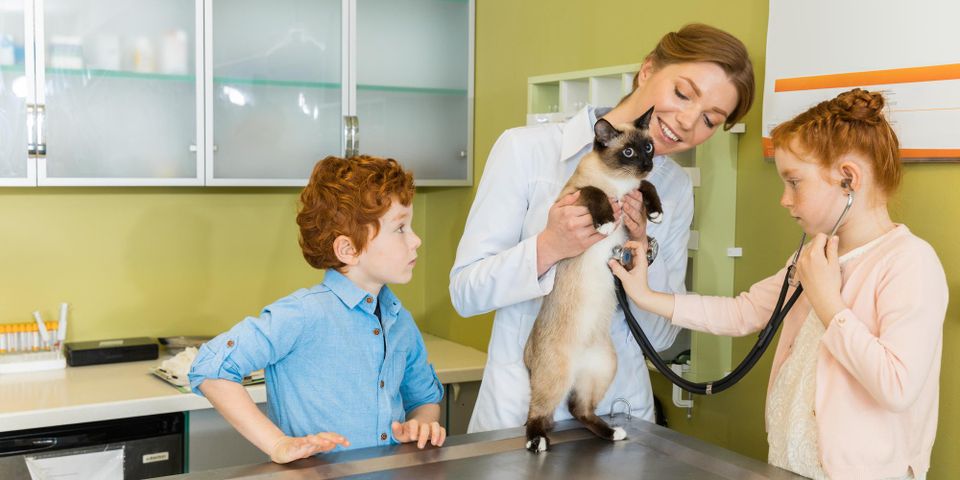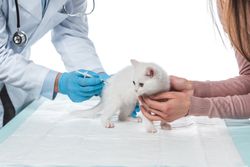
Since your cat or kitten is a loved member of your family, it’s natural to want to take the best care of it possible. This often means educating yourself on all the aspects of their care, including pet vaccinations. Below are a few questions you might have about the vaccines your veterinary clinic may recommend for your feline friend.
FAQ for Cat Pet Vaccinations
What should my cat be vaccinated for?
There are a total of nine preventable felines diseases that pet vaccinations can help prevent. They are the feline herpesvirus, calicivirus, panleukopenia, rabies, bordetella, chlamydophilia felis, peritonitis, immunodeficiency virus, and the leukemia virus. These are serious illnesses that all have different effects on your cat and their life, but your kitten may not need all of them. The feline distemper (panleukopenia), feline herpesvirus, calicivirus, and rabies vaccines are recommended for all cats, but the others are usually only given to those felines at a higher risk for contracting those specific diseases. A great team at a trusted animal hospital will assess your cat’s risk levels for these diseases and help you determine if you want your cat to receive them.
How often does my cat need them?
There are a variety of vaccines available for your cat, each with differing schedules for when to revaccinate them. Felines begin receiving vaccines during kittenhood, usually around six weeks old, and in adulthood, boosters are typically given every 1 or 3 years, dependent upon which vaccines your cat receives. Your veterinary clinic will provide you with a timeline for how often your cat needs to be revaccinated.
What are the risks?
As with any vaccine, there are some minor risks for side effects and complications in your feline after receiving a vaccine, but they’re rare, and the benefits outweigh the risks. Common side effects to most vaccines include swelling, lethargy, mild fever, loss of appetite, and slow movements (due to minor tenderness) in your pet, and they should dissipate within one to three days. Allergic reactions are possible—such as hives, swelling, and redness—but they occur in less than 1% of felines. Even more rarely, they can be severe, causing difficulty breathing, stomach upset, collapsing, and severe lethargy. The final risk to vaccinations is even rarer, a type of cancer called feline injection site sarcoma (FISS). A small bump or swelling at the injection site is normal for up to three weeks after the injections, but if the swelling grows at all or does not go away after that time, it could be FISS. If your cat experiences any allergic or FISS-indicative symptoms, contact your veterinary clinic.
Will it cause my cat pain?
 Your feline may experience a quick pinching sensation while being vaccinated—similar to what you experience when getting a shot—but it’s minimal. Afterward, your pet may display signs of minor discomfort or tenderness around the injection site area, but it should not be debilitating and should go away after two days. If your pet acts like they’re in a great deal of pain or are still in discomfort after several days, contact your veterinarian.
Your feline may experience a quick pinching sensation while being vaccinated—similar to what you experience when getting a shot—but it’s minimal. Afterward, your pet may display signs of minor discomfort or tenderness around the injection site area, but it should not be debilitating and should go away after two days. If your pet acts like they’re in a great deal of pain or are still in discomfort after several days, contact your veterinarian.
In Batavia, OH, you’ll find professional, reliable care for your cat, including pet vaccinations, at the Clermont Animal Hospital. Whether your animal needs a wellness exam or you want more information on the advantages of vaccinations, their experienced team is there to help. With more than 35 years in operation, they provide comprehensive, gentle care for your animals, including exotics, primates, and herd animals. Advanced treatments in the areas of neurology, dermatology, and laser therapies are available, and they have 24/7 emergency staff on-call. View their services online, then call (513) 732-1730 to schedule your pet’s appointment.
About the Business
Have a question? Ask the experts!
Send your question

